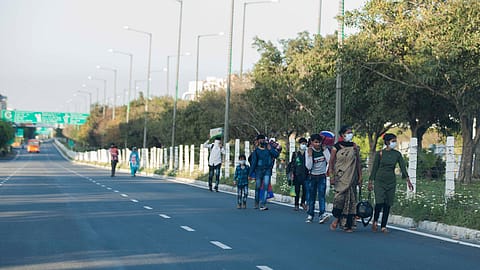World of fragile humanity
The cessation of economic activity has inevitably impacted the poorest in poor countries. The countries in which the majority live are constrained in how much they can shelter their most vulnerable.

The just in time burgeoning middle-class humanity, especially in lands of European ancestry and a few others in Asia, have suddenly had their lives disrupted on an unexpected scale. The expectation of instant satisfaction of whimsical desire, from throwaway attire and unrelenting entertainment in the palm of one’s hand and on the screen, to the ability to travel seamlessly across distances without hindrance, created a morally effete and self-indulgent narcissism. Now, in one stroke everything is unsure and god may come back into fashion once again, to jostle with self-satisfied contactless payment.
The moot question is what kind of world will emerge from the deadly clasp of the coronavirus, the eschewal of all prudential restraint and the callous despoliation of nature. It is not really divine retribution at all, but arrogant human indifference getting its comeuppance from established science, as journal articles and major scholars had already predicted was in the offing from rampant misdemeanours in Asian wet markets. But first, it would be well to dwell on the socioeconomic consequences of the coronavirus pandemic that has swept the world in mere weeks, to bring death and enforced house arrest to countless millions.
The cessation of much economic activity must inevitably impact the poorest in poor countries, dependent on daily wages for physical survival. The countries in which the majority live are seriously constrained in how much they can shelter their most vulnerable. However, the most populous among them, India and neighbouring Bangladesh, could rise to the challenge in part. Despite paucity of financial resources, organisational competence and determination could stave off hunger and starvation for many months. Unlike the countless famines of the past, more than 20 million dying from starvation under Britain’s benign imperium between 1867 and 1943, food supplies could last for many months. And efficient distribution will stave off the worst. In addition, cash payments to those with bank accounts will ease the administrative burden of reaching those without it. A truly statesmanlike gesture by India would be to offer food supplies to Bangladesh, if the need arose.
Elsewhere in the world, the millions of beneficiaries of low-wage factory employment, in countries like China most of all, which pulled them out of millennial poverty, its curtailment is an ominous harbinger of potential consignment to a fate many thought they had escaped permanently. Similar threats are posed to other recent industrialisers that sought to follow the example of the East Asian NICs earlier. Yet, much depends on how international politics and the economic imperatives of the marketplace interact.
The desire to limit the exposure due to globalisation will surely be hard to resist and not merely due to justified enragement at the criminal callousness of the party apparatchiks of China, who have transitioned from oppressing their own hapless citizenry to waging war on everyone else. Yet, pulling out of China will prove a costly business, and for many reasons. Sunk investments can be written off once amortised, but the use of a skilled and relatively low-cost labour and the servicing of China’s domestic market are compelling reasons for not cutting off one’s nose to spite one’s face. In fact, if the Chinese authorities take strong action and also allow greater international scrutiny of its unhealthy culinary habits and associated sources of endangerment, the calculations of investors in China may change. But, still, a degree of geographical diversification of investment is highly likely in order to gain the trust of markets.
The rest of the world’s developed economies will recover their heady self-confidence though a little poorer and its denizens chastened. One anticipates business will resume as usual, once the pandemic subsides, economic activity recommenced and stock markets rediscover their dizzying irrational exuberance. It is possible, the electorate will apportion some of the blame for their coronavirus travails on incumbent politicians, finding fault with the handling of the crisis that caused so much distress. It means Donald Trump may not win a second Presidential term and Boris Johnson’s sheen will be rather tarnished, showing less competence than was expected though, ultimately, hesitant British policy responses stemmed from genuine disagreements among expert advisers. The Narendra Modi phenomenon will surely also suffer setback because the optimism that he brought to India will be diminished by awareness that mortality always stalks human endeavour.
Humanity, though, is indifferent to its own history and many instances of catastrophic setback make the Coronavirus pandemic pale in comparison. Twice almost all life perished on earth due to meteorological and climatic events. Volcanic eruptions in Siberia wiped out 90% of all life once though 250 million years ago and half the earth’s species perished when a meteorite struck New Mexico 65 million years ago. Distant but closer to the human time scale, 73,000 years ago, volcanic eruptions in Indonesia caused a winter that killed off most of the human race. And all animal life was extinguished when a comet collided with the earth 13,000 years ago. In other natural events, nearer to contemporary man, societies in south and west Asia collapsed 4,000 years due to drought, a similar fate overtaking China’s Tang dynasty in 750—900 AD. Even more recently, half to a third of Europe died in the mid-14 century plague and more lately still, a third of the world’s population was extinguished after a mid-seventeenth century cold spell, without parallel in a thousand years. Thus, a salutary lesson is to be learnt of the fragility of humankind and the compelling rationale for greater cooperation on many fronts that allow the earth’s abundance to be shared instead of endless destruction by futile conflict over it.
Recommended Stories
Views are personal.
The author taught international political economy at the London School of Economics and Political Science for more than two decades.